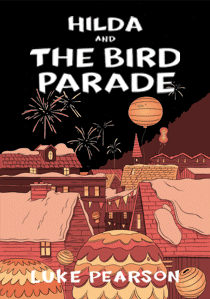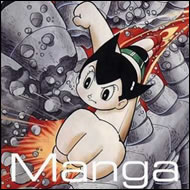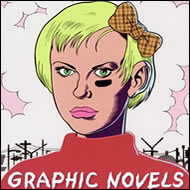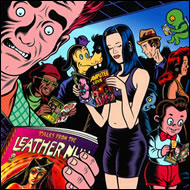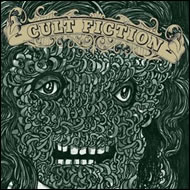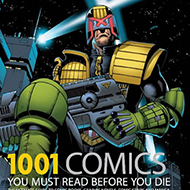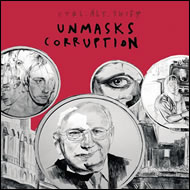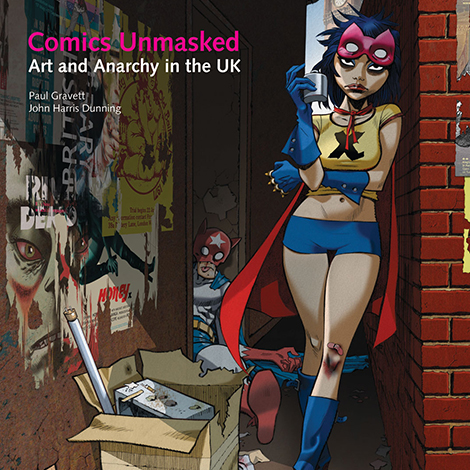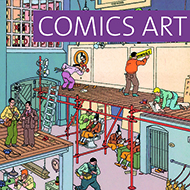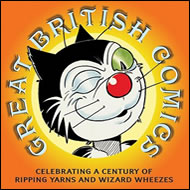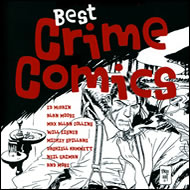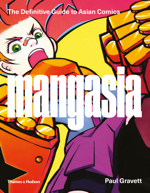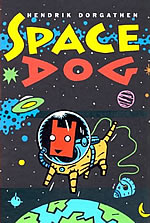Erlangen Comics Salon 2008:
The German Comics Festival
Next week sees the Frankfurt Buchmesse or Bookfair open its doors in Germany, the largest of its kind in the world for the trade but also open over the last weekend to the public. Over the past few years, Frankfurt has spotlighted graphic novels and comics prominently, reflecting their growing importance in the market, and invites major international creators and authorities for a programme of talks and signings. They also focus on comics from a different guest country, this year being Turkey.
Aside from Frankfurt, the biggest and best festival in Germany devoted specifically to comics takes place every two years in Erlangen. I had the chance to visit the festival for the first time in May 2008 and here’s my report with some of my photos too. There are are more official photos to view here and here.
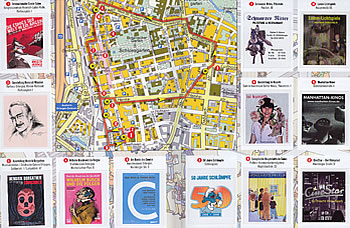
Erlangen Festival Map
from the Panini sticker album
To start off and orientate you, here’s a map of the town with highlights of the main festival locations. Erlangen’s not a major city so it’s quite easy to get about on foot and there are free shuttle buses circulating all day. To encourage visitors to go to all of the various exhibitions the Festival gave away a Panini sticker album which you could fill up with free stickers available only from the specific venues. It’s a great idea and I was was one of many who made the effort to collect the whole set. And in the process, people who had traipsed to a place, once they got there, would decide to take a look at the exhibitions anyway. This way, the public encountered stuff not on their radar, unfamiliar stuff they might never have tried otherwise.

Cover of the The Erlangen Festival
Panini sticker album
The sheer range of exhibitions proves how all-encompassing this Festival or Comic Salon tries to be, from past to future, family fun to artsy adult, German to global. 2008 marks the centenary of the death of Wilhelm Busch (1832-1908) and a great museum exhibition mixed his original art, rare books, photos and artefacts with contemporary German artists’ tributes. He’s viewed by many as the greatest grandfather of German comics and a major figure in 19th century Bilderbogen, single-page, multi-panel picture stories that were hugely popular early comics. Busch’s mischievous brats Max & Moritz also directly inspired The Katzenjammer Kids, one of the seminal Sunday page "funnies" that, with several cartoonists of German or Austrian background like Rudolph Dirks (Katzenjammer) and Fredrick Burr Opper (Happy Hooligan), helped boost American newspaper strips into a massive early 20th century medium. I was intrigued to see some German translations of Katzenjammer Kids’ pages, where the twosome were re-named Max and Moritz. In 1937 Busch was granted a museum dedicated to him in Hanover, but strangely, his effect on the medium would prove less profound in his home country than across the Atlantic.

A Max & Mortiz tissue
It’s worth considering just how significant and influential Germany was during the 19th century for the emergence of mass-market comics. For a start, there was Goethe’s whole-hearted support for the Swiss teacher Rodolphe Töpffer’s first graphic novels and then the major international influence of Busch and his peers. So it’s puzzling how fragmented and faltering the medium’s progress has been within Germany itself through much of the 20th century. World wars, Fascism and the Cold War division of the nation didn’t help of course, nor did a tide of Fifties anti-comics prejudice against American imports and their locally produced imitators. Not that Germany didn’t have some amazing comic artists and cartoonists in the past, from the gang at Simplicissimus magazine to e.o plauen, pen-name of Erich Ochser, whose Vater und Sohn (‘Father and Son’) is a touching gem of the silent strip genre.

Till Eulenspiegel
by Ralf Kauka
Browsing through the second-hand dealers stands I picked up a facsimile of the first issue of Till Eulenspiegel, the 1953 kids’ comic from Ralf Kauka, toned-down from the traditional medieval trickster. It was here that Kauka’s Fix und Foxi soon debuted and 55 years later they are still going strong as a monthly after a break between 1994 and 2005; I’ve had a soft spot for them and especially slacker wolf Lupo since discovering them on family holidays to Germany and Austria in the Seventies.

A Lurchi book cover
A new retro-discovery for me was the salamander character Lurchi who is still the mascot for his line of shoes, now sporting rollerblades. I got a lovely hardback compilation of several of his colour promo-comics, one of them set at an animal olympics.

Till Eulenspiegel
by Ralf Kauka
Another find was a German edition of French cartoonist Jean Effel’s charming angelic comedies.
.jpg)
A Jean Effel comedy strip

Der Kleine Engel
by Jean Effel
Heritage was also well-represented at the Salon in a tribute exhibit to post-War legend Hansrudi Wäscher. It was a thrill to meet the man himself, 80 this year, and get an autographed stamped envelope. His cheery, beefy, big-chinned heroes from history, space and the jungle with their often incongruous Fifties hairstyles have a naive ernestness and charm all their own. Also launching in 1953, Wäscher’s cliffhanger serials, popularised in over 1,500 little Piccolo booklets the size of single newspaper strip, have built up a strong nostalgic following.
But it’s really in recent years that the state and status of comics in Germany have been changing rapidly and based on my visit this May both have never looked rosier. While the tides of translated imports from America, Japan, France, Belgium and elsewhere can be hugely popular here, what’s different now is the breadth and brilliance of much of the homegrown material and the unmistakeable rise of the graphic novel as a term, a format and a movement embraced by creators and publishers, press and public alike. Only a few years ago, when my Graphic Novels: Stories To Change Your Life book was first published, German publishers were not sure about the term and concept at all and were uncertain if they would catch on. Now, Egmont and Carlson, two of the big players, are translating and originating graphic novels and four others, Avant Verlag, Edition Moderne, Reprodukt and Edition 52, have banded together under this label to create an online resource, www.graphic-novel.info.

Chinese guests from the Panini sticker album
So now was perfect timing to be invited to the 13th Erlangen Comic Salon by director Paul Derouet. As well as my taking part in a roundtable discussion on global comics with Guy Delisle (Quebec/France), Yao Fei La (China), Jaqueline Berndt (Germany/Japan) and others, I gave an illustrated lecture on modern Chinese comics based on the London exhibition of manhua I curated earlier this year. In particular, I highlighted the new scenes emerging in Hong Kong and China and ended with an emotional reading of two of Coco Wang’s 5/12 Earthquake reportage strips. As part of this China year, Paul Derouet curated his own impressive exhibition/installation in the massive, high-ceilinged hall, using high-tech, custom-made metal frames and DVD monitors set amongst potted reeds in pools of water and bursts of artificial mist, navigable via slatted wooden walkways. The emphasis here was on original artworks by mainland Chinese creators, so nothing from Hong Kong or from the Beijing/Shanghai underground scenes, and mostly on the more mainstream and manga-inspired artists. Superstar Benjamin was, as ever, the big attraction as TokyoPop published him in German for the first time. A huge blow-up by him adorned the Festival’s entrance. I’m also a big admirer of Yao Fei La and his entourage, several of whom are represented in the third Mammoth Book Of Best New Manga out next month in colour from Robinson. The only drawback with the exhibition is that it’s on show for only the four days of the Festival and deserves to be seen for much longer and by many more people.

Chinese guests from the Panini sticker album
One trend these days is the unstoppable ascendence of women graphic novelists. It’s about time women found much more of a voice through comics, as creators and as readers. I really appreciated exhibition, Pommes d’Amour or ‘Love Apples’ brought together some of the most promising German and French women, each contributing a love story to a new anthology. Delcourt are bringing this out in French this autumn. Women also scooped several awards. Line Hoven, whose Liebe Schaut Weg was one of my Best of 2007, won an Ikon award and had a solo show of her amazing scraper-board pages, while the extraordinary artist and teacher Anke Feuchtenberger received one of the Salon’s prestigious awards, the Max & Moritz prizes.

Johnny Cash
by Reinhard Kleist
Another of my modern German favourites, Hendrik Dorgathen, the graphic genius behind Space Dog, had an amazing exhibition called Comicoides, as in "comics-like", of his framed comic art, plus sketches, experimental artworks and collages made specially for the gallery and a construction of cube shelves stacked with loads of his bizarre collectibles. Most striking was the bulky metal boiler-tank stood outside the gallery which he’d decorated in his alien-tribal motifs. Dorgathen has returned a bit to comics lately and Moderne have compiled his most recent short stories into a cool hardcover entitled Slow. Also making waves with a show and books at the Salon was Reinhard Kleist with his stylish biography, Johnny Cash: I See A Darkness, which grabbed the Best German Album prize and is apparently due out from Dark Horse in English. Another slice of history, about Stalinist spies at the German Embassy in World War Two Tokyo, is recounted by Isabel Kreitz in her 250-page, meticulously researched graphic novel from Carlsen, Die Sache mit Sorge, surely one of the German books of the year.

Johnny Cash
by Reinhard Kleist
The Salon is so much more, of course, than exhibitions and books; it’s all the interactions, friendships old and new and encounters at openings, parties, meals, and over the breakfast table too. Fellow hotel guests I munched with included Guy Delisle, off to Jerusalem next with his wife, assigned there through her job for Medecins sans Frontières - so after Burma, Delisle’s next reportage location is all set now. Another morning I smelled the coffee with Line Hoven and her partner Arne Bellstorf, expecting their first child. Arne’s next big project will be one of the crossover hits, I am sure - Baby’s In Black: The Story Of Astrid Kirchherr & Stuart Sutcliffe. A sneak peak at the cover image has just been released by publishers Reprodukt for Frankfurt - how cool is this?

Baby’s In Black
by Arne Bellstorf
Also in town was Ho Che Anderson, whose Martin Luther King bio was out in German, and I finally got to met Zoran Janjetov, whose Serbian Boy George comic in his Moebius-style was featured 24 years ago in the third Escape magazine. I missed out on the awards night as I was out having an Indian with Titus Ackermann and the Moga Mobo mob. They’d just got back from Cuba where they had hooked up with local artists, veterans and youngsters, and collaborated on new comics for their latest issue. I gather the ceremony went well and from the lobby I did overhear Alan Moore’s basso profundo tones filling the fancy theatre as he phoned in to accept his award. The final stickers to complete my Panini album were all the winners, making it a wonderful souvenir of the Salon.
Erlangen is also a great place to feel the pulse of emerging comics creators from the small press. Three anthologies caught my eye. Orang sprang out of the Hamburg art school and the latest issue is their best yet. From Lucerne, Switzerland comes the lo-fi quarterly Blutt with loads of promising newcomers working to a set theme - in their latest, ‘Fake’. And from Austria, where the local comics culture is stirring up nicely, comes Perpetuum, a classy, state-funded tome of indigenous talents. Now my school German started coming back a bit but is nowhere as good as my French. Luckily, several Germanophone artists have books out in English, so language is no barrier. Mawil, whose name sounds in German just like Marvel, has his second book, We Can Still Be Friends, out from new UK publishers Blank Slate Books. He’s got a beautifully loose, expressive line which suits his autobio tales of his unrequited pubescent love and lust perfectly. Top Shelf put out his first book in English, Beach Safari, in 2003, and Blank Slate are lining up another from him, in this more funny animal style, for 2009. Meantime Top Shelf have co-published the wordless comics by Ulf K. starring his everyman Hieronymus B. and one of my absolute favourite comedy cartoonists, Austrian Nicolas Mahler. His speechless Van Helsing’s Night Off cracks me up with such exquisite humourous timing and macabre mirth. You can also get two ravishing books by Anke Feuchtenberger in English from Bries in Antwerp featuring her unique, unsettling world of W the Whore, collaborating with poet Katrin de Vries.
Finally, to backtrack a bit here, before arriving in Erlangen on the Thursday, I flew first to Frankfurt on the Wednesday to meet my friend, cartoonist, artist and fellow comics researcher Andy Konky Kru so that I could catch two comics exhibitions there with him. What better way to ground myself in Germany’s post-War history than a visit to Comics Made in Germany, an exhibition at the German National Library. Books and magazines rather than original art were the focus showing the Library’s own copies in glass display cabinets. Curator Dr. Bernd Dolle-Weinkauff charts sixty years of German comics starting from November 1947 when 10,000 copies of the first post-War complete magazine-format comic book by a German artist were published: Bumm macht das Rennen!, a somewhat naive but enthusiastic detective thriller starring a young hero named Gerd. This was the first and last comic by the 25-year old Klaus Pielert, who forthwith abandoned comics to pursue a career as a political cartoonist. To find out much more, click here, to see where the Goethe Institut has compiled a really useful set of online articles and links on the German comics scene. And for anyone curious to plunge even deeper into German comics history, historian Eckart Sackmann has edited the fourth of his superb hardback annuals, Deutsche Comicforschung, published by Comic Plus, stuffed with amazing material recovered from the past, including the delightful Walter Trier (who went on to draw great covers for Lilliput magazine in Britain) and Max Otto, whose zany, almost Milt Gross-like cartooning stood out for me. It’s proof that there an awful lot more to German comics than you might suspect, once you start digging into the archives.
And the other Frankfurt exhibition I had to see was on Manga at the Museum for Applied Art. Rare manga books were on display alongside much older prints and scrolls, though no sign of original art from actual manga. Still it was a treat to see examples of the painted panels for a kamishibai or "paper theatre" performance, as demonstrated recently in London. And the gallery was dominated by a room you could walk into made out of hanging fabrics handpainted with Japanese text and crazy imagery by wildman mangaka Shiriagari Kotobuki.
All in all, my five days in Germany were hugely enjoyable, enlightening and encouraging. The country now is truly alive to the potential of comics in all their forms and the Erlangen Comic-Salon definitely ranks as one of the highpoints of the European comics calendar. I’ll be making a date to go back there in 2010 - and meanwhile, keeping a close eye on German comics as they come into their own.
Posted: October 13, 2008
